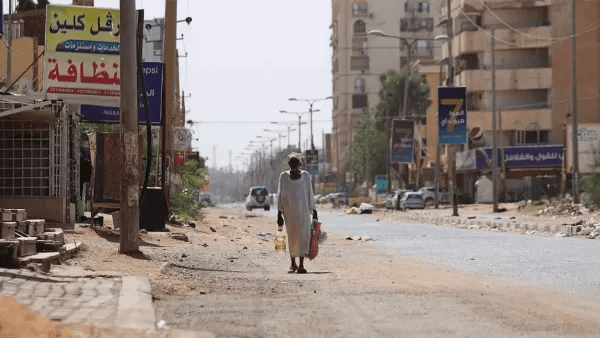By Rawh Nasir
Communal kitchens are assisting hundreds of thousands of people in Sudan’s embattled capital, Khartoum, providing regular meals as well as social and emotional support amid a deepening famine that international aid groups are failing to tackle.
Run by neighbourhood-based mutual aid groups called emergency response rooms, the kitchens are struggling with crippling funding gaps, security threats, and communications and electricity blackouts, volunteers told The New Humanitarian.
The wide-ranging challenges mean many kitchens only offer one meal per day, while some emergency response rooms have cut back to a single meal per week, or have temporarily closed down even while their communities remain in desperate need.
“The service which we gain from the kitchen is life-saving… but the food amount is not enough for everyone. Circumstances are very bad here,” said Nisreen*, a woman from Umbada locality in Omdurman, a major city that is part of the Greater Khartoum area.
Nisreen said the Umbada kitchen is currently only able to offer one meal per week, usually beans or lentils. Still, people are dependent on that small amount, and a further reduction would be a “disaster”, she added.
Sudan’s war began in April 2023 and pits the paramilitary Rapid Support Forces (RSF) against the regular army. It has produced the world’s largest displacement crisis, uprooting nearly 10 million people, and the biggest hunger crisis too. One recent study predicted 2.5 million starvation deaths by September, while others are warning of the world’s worst famine in 40 years.
Some of the most extreme hunger levels are in Greater Khartoum, which includes the devastated capital and its adjoining sister cities – Bahri and Omdurman. Most of the area is controlled by RSF fighters, who invaded people’s homes at the start of the conflict and stripped them of their possessions.
picture
Most international aid groups evacuated Khartoum at the outset of the fighting and haven’t yet returned. Their efforts to bring in supplies have been scuppered by the army and aligned authorities, which seek to starve RSF-occupied territories of relief.
While volunteers are leading an aid response, the number of people depending on them is growing as people’s coping mechanisms are eroded, and as thousands return to the capital, fleeing attacks and suffering in the places they had fled to.
The local and diaspora funding that sustains the kitchens is reaching its limits, volunteers said. And support from international donors remains insufficient, despite more humanitarian agencies engaging with emergency response rooms.
“The funding is nothing compared to what people need,” said Mawada, a kitchen volunteer from Umbada. She said her group is committed to helping its community despite the mounting challenges: “The two warring parties failed to help civilians, but we can do, and we will continue to.”
Saving lives and dignity: ‘Everybody should be able to eat and not feel shame’
Mutual aid groups established themselves across Sudan after the war erupted. They drew members from a vibrant pro-democracy movement, and brought ideas rooted in a rich heritage of social solidarity, best represented in the tradition of nafeer (“a call to mobilise”).
The Greater Khartoum kitchens follow two different models. Under the takaya system, religious and community leaders feed people on the streets, in houses, or under trees; but there are also more structured kitchens run in defined spaces by the emergency response rooms.
Hassan, who helps coordinate assistance across Greater Khartoum, said over 350 communal kitchens have been set up, assisting 500,000 families with at least one meal a day. “We aim to save people’s dignity,” he said. “Everybody should be able to eat and not feel shame. We, as Sudanese, are still helping each other. We survive together.”
Volunteers said the kitchens run regular funding campaigns, using social media to request money from philanthropists and diaspora networks. They also receive disbursals from national and international NGOs, as well as from UN-managed funds.
While international aid is blocked, the kitchens deal with local traders – some affiliated with the RSF – who are adept at navigating checkpoints and crossing front lines. Volunteers buy goods from them either in markets or straight from traders’ houses.
The kitchens operate from relatively space places and are set up so that nobody has to travel too far to reach them. On top of food, they function as communal spaces where teachers run alternative education programmes and women organise cooperatives.
While volunteers often work long hours preparing the food, they have time to participate in social activities and to come “together and chat” as a group, said Jamal, a volunteer from Khartoum’s Al Jerief West locality.
Several volunteers said their public service helps them feel powerful and resilient, and that before joining the kitchens they had felt traumatised by war and sometimes too afraid to leave their houses.
“This is what keeps me staying in the conflict areas,” said Ibrahim, a coordinator of the Maygoma kitchen in the Sharg Alneel area of east Khartoum. “In my childhood, I used to pray to have enough money to help others, [but] I found out that it is not important to have money.”
Low funding, increased needs: ‘Each day we see new faces’
Despite their positive experiences, the half a dozen volunteers who spoke to The New Humanitarian said their kitchens lack adequate funding and resources, especially as the number of people in need balloons.
Ibrahim, from the Maygoma kitchen, said volunteers used to cook lunch as well as breakfast for their community, but they are now only offering just one meal a day. “The number keeps increasing. Each day we see new faces,” he said.
The vast majority of donor money has gone to the UN and international NGOs despite their limited access to the most conflict-affected places and the restrictions warring parties place on them.
Mustafa, a kitchen coordinator in Al Kalakla locality in south Khartoum, said his group had observed a “high number of returnees” who left the capital for adjoining Gezira state last year but came back after the RSF invaded it in December.
Mustafa said 10 kitchens in a part of Al Kalakla called Abu Adam have a budget of just $800 each per month. He said he has seen people so hungry they are eating leaves from trees to survive.
Local philanthropists and benefactors in the diaspora have provided critical contributions over the past year, but that funding “is decreasing with time because they have other responsibilities”, said Ibrahim.
Emergency response rooms have received only a fraction of the hundreds of millions of dollars that international donors have provided to humanitarian actors in Sudan.
The vast majority of donor money has gone to the UN and international NGOs – themselves badly stretched financially – despite their limited access to the most conflict-affected places and the restrictions warring parties place on them.
“This is a really important part of the humanitarian response which isn’t appropriately recognised or supported at the moment,” Will Carter, country director in Sudan for the Norwegian Refugee Council, told The New Humanitarian.
“Out of a total aid appeal of over $2 billion, it’s not that much to ask for between 2% and 5% at least for all these brave frontline responders that are providing very critical services in very neglected and hard to reach areas,” Carter added.
Carter said one of the main problems is that donor governments have rigid policies and funding procedures that clash with how local response efforts are organised and with “what their priorities are and should be”.
Some communal kitchens said they have reached out directly to international organisations for funding, but this approach can leave behind groups that don’t have strong English-language skills, or the ability to speak the language of international aid.
Blackouts, high prices, and security threats
Fundraising and outreach efforts have also been impacted by an internet blackout – reportedly imposed by the RSF – that means volunteers cannot easily do media awareness campaigns.
The blackout is also challenging because it prevents emergency response rooms from accessing e-banking systems, which they use to receive and spend money amid cash shortages and bank closures, said Hassan, the coordinator for Greater Khartoum.
While funding for the kitchens is low, the prices of goods can be incredibly high, according to volunteers and traders. One businessman working in Al Kalakla said “inflation is digging into people”, with sugar costing eight times its pre-war level.
Traders bringing food into RSF-held areas said they are sometimes denied access at army-controlled checkpoints, which chokes supply and hikes up prices. They also have to contend with paramilitary forces stealing their stocks in markets.
The volunteer said the kitchen is now doing its activities “low profile”: cooking inside people’s homes, and only distributing food to the most vulnerable within their community.
Electricity blackouts are another challenge, especially in areas where power is needed to pump up water from the Nile. Ibrahim, the Sharg Alneel volunteer, said the lack of water has periodically resulted in their kitchen work being suspended.
Other volunteers cited a lack of cooking gas as a problem, with too little supply and unaffordable prices. Some kitchens have been cutting down trees and using firewood as a substitute.
Security was also raised by volunteers as a critical challenge. Though RSF leaders have made statements supporting local humanitarian efforts, volunteers said they continue to get investigated and arrested based on spurious allegations that they are tied to the army.
A volunteer from one kitchen (The New Humanitarian is not disclosing its name for security reasons) said the RSF closed down their operations after it published a recent statement condemning the paramilitary group’s violations against civilians.
The volunteer said the kitchen is now doing its activities “low profile”: cooking inside people’s homes, and only distributing food to the most vulnerable within their community.
Kitchens operating in areas held by the army and the de facto government also face security threats. These authorities see aid as a political and military resource, and are suspicious of volunteers receiving funds outside of a system they can control.
What needs to be done
Going forward, Carter of the Norwegian Refugee Council called for donors to increase their financial flows to local response efforts, and suggested they should adapt some of their policies so as not to drown volunteers in paperwork and processes.
“I think the point of this is not to require [mutual aid groups] to be NGOs but to find a model that supports them in delivering critical services in very difficult and dangerous parts of the country, [while] minimising any bureaucracies or burden,” he said.
With more resources, Hassan, the Greater Khartoum kitchen coordinator, said the emergency response rooms would be able to set up local markets and bakeries across the region.
For now, however, he said the groups are demanding that the warring parties allow volunteers to work safely, open humanitarian corridors for aid groups, and make progress on peace talks.
Saja, who receives support from the kitchens in Sharg Alneel – one of the most populous parts of Khartoum – said another meal a day would go a long way to improving people’s lives.
“There are many, many families that are totally depending on the kitchens,” she told The New Humanitarian. “Without them, I could not even imagine what our lives in this conflict would look like.”
This article was first published by the New Humanitarian:

